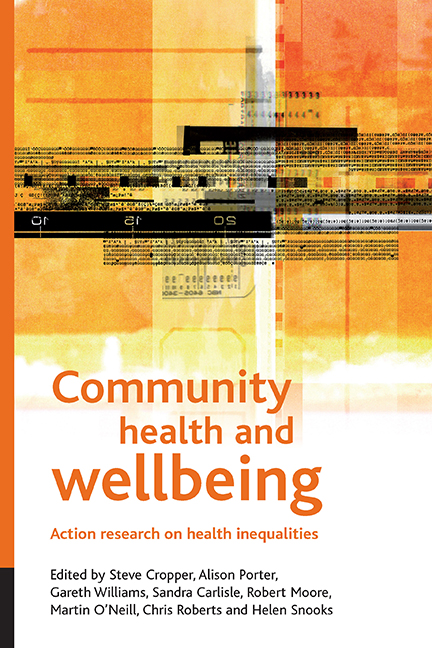Book contents
- Frontmatter
- Contents
- List of tables and figures
- Preface
- Acknowledgements
- Notes on contributors
- one Health inequalities in their place
- two ‘Policy experiments’: policy making, implementation and learning
- three Policy innovation to tackle health inequalities
- four Action research partnerships: contributing to evidence and intelligent change
- five Engaging with communities
- six The role of the community-based action researcher
- seven Evaluation, evidence and learning in community-based action research
- eight Social theory, social policy and sustainable communities
- nine Beyond the experimenting society
- Index
- SHARP DVD: A Way of Working Together to Improve Our Lives
two - ‘Policy experiments’: policy making, implementation and learning
Published online by Cambridge University Press: 15 September 2022
- Frontmatter
- Contents
- List of tables and figures
- Preface
- Acknowledgements
- Notes on contributors
- one Health inequalities in their place
- two ‘Policy experiments’: policy making, implementation and learning
- three Policy innovation to tackle health inequalities
- four Action research partnerships: contributing to evidence and intelligent change
- five Engaging with communities
- six The role of the community-based action researcher
- seven Evaluation, evidence and learning in community-based action research
- eight Social theory, social policy and sustainable communities
- nine Beyond the experimenting society
- Index
- SHARP DVD: A Way of Working Together to Improve Our Lives
Summary
Introduction
There is an enduring interest in the ways in which public policy is formed, communicated and embedded into public (and private) life. We might expect that, where policy directly addresses community and individual well-being and health, there would be intense debate about the content of policy, especially as its implications for the distribution of responsibility, authority and action become clear. Given this, the design or, perhaps, the unfolding of the policy process is also a matter of some importance. A classic 1960s study of community politics asked: ‘Who governs?’ (Dahl, 1963). In commenting on Dahl's study, Saunders (1979) noted that the question of legitimacy is central to the design of what we now increasingly refer to as ‘the system of governance’. This idea of governance gives less privilege to the ‘centre of government’ from which policy is determined and issued, but rather sees policy as emerging from a series of influences and negotiations, openings and resistances that interested parties might seek and take as legitimate opportunities to engage or not. The ‘opportunity structure’, that is, the distribution of different forms of access to power, is changing, the intention being to broaden involvement in policy making at all levels of government and indeed of relevant agency. The debate about health inequalities, and where responsibility for action on health inequalities rests, continues. Despite hints of movement towards government and the corporation, with their greater institutional leverage on environments, the distribution of wealth and lifestyle products, there has equally been emphasis on individual choice (of lifestyle) – most clearly signalled in the English public health White Paper Choosing Health (DH, 2004). The question, then, is how policy comes into being and is sustained, or otherwise; this may be of most interest in the range of practices it seeks to influence, but policy may colonise practices it did not seek to affect and it may fail to touch practices of central concern.
In this chapter, then, we consider the nature of public policy and the ways in which policy is made, and we examine attempts to improve policy making and its effectiveness, in particular against a challenging agenda of revitalisation of welfare and public service.
- Type
- Chapter
- Information
- Community Health and WellbeingAction Research on Health Inequalities, pp. 23 - 48Publisher: Bristol University PressPrint publication year: 2007

